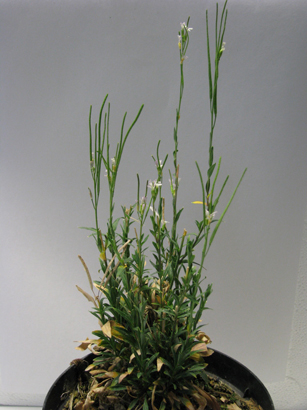Better known as rockcress, Boechera holboelli is a perennial plant found in the woodlands. It belongs to the family Brassicaceae and is related several vegetables such as mustard, broccoli, Brussel sprouts, kale and turnips, as well as the model systems Arabidopsis thaliana and Capsella rubella, both of which were sequenced by the DOE JGI. Unlike its relatives, however, B. holboelli is the first plant to be sequenced that reproduces asexually in a process known as apomixis, in which plant embryos develop without being fertilized by pollen, resulting in what are essentially clones of the parent plant.
The process of apomixis is still poorly understood but the information could be used by farmers to speed up crop improvement practices. The resulting crops could be better adapted to changing environmental conditions, as well as have increased crop yields for food and biofuel feedstock use while reducing production costs and concerns about unwanted genetic variations that could affect yield or spread in the wild. Sequencing B. holboelli’s genome would allow researchers to gain insight into how this process works and what genes are involved.
Principal Investigators: Ueli Grossniklaus, University of Zurich
Program: CSP 2010
